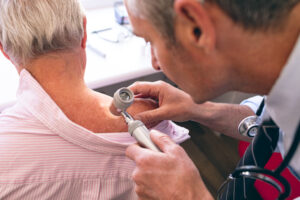Tinnitus affects a significant number of veterans, many of whom are service-connected for this condition. Leah will explore the top five conditions related to tinnitus in the context of Veterans Disability. While there might be connections between tinnitus and other medical issues, individual circumstances can vary. This is intended to provide insights into potential secondary conditions related to tinnitus.

Understanding Tinnitus
Tinnitus is characterized by the perception of ringing or other noises in one or both ears without any external sound source. It affects 15 to 20% of people, with older adults being particularly susceptible. Commonly associated with noise exposure during military service, tinnitus can result from various factors. Some of these are age-related hearing loss, ear injuries, or circulatory system issues. Tinnitus often improves with treatment of the underlying cause or with interventions that reduce noise.
Migraines and Tinnitus
Migraines can be triggered by stress, noise, lights, and sounds. According to the American Migraine Foundation, tinnitus is observed in many migraine patients. The intensity of tinnitus often worsens during migraine attacks. Research, such as the article “Maladaptive Neural Synchrony and Tinnitus Origin and Restoration” in Frontiers in Neurology, highlights the bidirectional relationship between headaches and tinnitus, providing a scientific basis for veterans seeking disability benefits.
Insomnia and Tinnitus
Insomnia and tinnitus create a worrisome cycle, as revealed in studies like “Insomnia and Tinnitus: A Worrisome Cycle“. Additional research in the Biological Psychology and Sleep Medicine Reviews journals establishes a connection between chronic tinnitus and sleep disturbances. Veterans experiencing insomnia alongside tinnitus may find support for their disability claims by referencing these studies during medical evaluations.
Anxiety and Depression
Tinnitus patients often suffer from anxiety and depression, as outlined in the article “Tinnitus Patients Suffering from Anxiety and Depression: A Review” from 2017. The International Tinnitus Journal indicates that the added burden of tinnitus can exacerbate mental health conditions. Understanding the neurobiological basis for the overlap between tinnitus and anxiety/depression is crucial for veterans seeking disability benefits.
Somatic Symptom Disorder
Somatic Symptom Disorder, a chronic pain condition, is another ailment commonly observed in veterans with tinnitus. The relationship between tinnitus and SSD highlights the need for comprehensive assessments when evaluating disability claims related to tinnitus.
Tinnitus as an Intermediate Step
Tinnitus may serve as an intermediate step leading to other medical conditions, such as sleep apnea. While there might not be a direct causative link between tinnitus and conditions like sleep apnea, the development of mental health issues due to tinnitus could contribute to subsequent health issues. Veterans navigating the disability claims process should consider presenting tinnitus as a potential intermediate factor in the development of associated conditions.
Conclusion
In summary, veterans may experience various secondary conditions related to tinnitus that warrant consideration in disability claims. Migraines, insomnia, anxiety, depression, SSD, and tinnitus as an intermediate step all contribute to the complexity of veterans’ health profiles.
When pursuing disability benefits, it’s crucial for veterans to present relevant medical literature and evidence. It will be easier to support the connections between tinnitus and these secondary conditions during medical evaluations. Each case is unique, and understanding the multifaceted nature of these relationships is essential for a thorough and effective claims process.
Also read: Obstructive Sleep Apnea & Gastroesophageal Reflux in Veterans Disability
At Prestige Veteran Medical Consulting, a veteran-owned company, we specialize in Independent Medical Opinions (IMOs) known as Nexus letters.
Our purpose is to empower YOU, the veteran, to take charge of your medical evidence and provide you with valuable educational tools and research to guide you on your journey.
Understanding the unique challenges veterans face, our commitment lies in delivering exceptional service and support.
Leveraging an extensive network of licensed independent medical professionals, all well-versed in the medical professional aspects of the VA claims process, we review the necessary medical evidence to incorporate in our reports related to your VA Disability Claim.
Prestige Veteran Medical Consulting is not a law firm, accredited claims agent, or affiliated with the Veterans Administration or Veterans Services Organizations. However, we are happy to discuss your case with your accredited VA legal professional.













